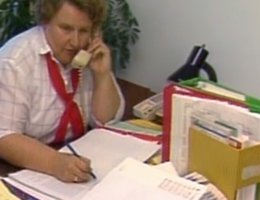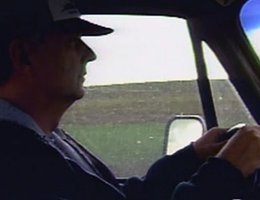
As more and more farmers came under stress, neighbors and eventually statewide organizations tried to help. The goal of most of these support groups was to help the farmers work through the hard times, if possible. If that was impossible, the goal turned to providing emotional support as the farmers found new careers.
Personal support became organizational support when the Interchurch Ministries of Nebraska created the Farm Families Crisis Council (FFCC) in 1984. The new agency was set up to provide counseling for financially stressed farm communities. To reach those in trouble, the council created a crisis hotline — a toll-free number that folks could call to get answers to legal and technical questions as well as professional emotional and career counseling.
Most of the time, counselors focused on the emotional stress of the farm crisis.
"The most difficult group to help," according to one counselor, "are farmers who are 58 years and older. Their home, life savings, identity, life work have been wrapped up in the farm. They don’t really have alternatives."

After the initial call, the hotline sent those in crisis to FFCC counselors. The counselors got information sheets and basic descriptions of the callers’ farm operations. Then the counselors tried to help in any way they could — sometimes, that meant filling out application forms to obtain loans. Sometimes that meant helping families get food stamps or find legal aid. Sometimes that meant helping to work out a business plan for the operation. Sometimes that meant just listening. Counselors found that two issues constantly popped up when they are meeting with farmers — financial issues were the basis for most telephone calls, but clients also developed emotional problems in the relationships among themselves, their families and friends.
The FFCC chose counselors carefully. Each field worker had a farming background and received field staff training. They were paid $5 an hour on a quarter-time basis. Most had been through financial difficulties in their own farming or ranching operations. Some also had backgrounds in areas like finances or taxes. For the field workers, the rewards of the job came not in the small salary but in being able to help others who were experiencing the same financial problems they experienced.
There were also volunteers at the hotline. On calls, they tried to help farmers take a realistic look at their cash flow. If it was needed, volunteers gave farmers the names of bankruptcy lawyers with experience. Field workers and hotline volunteers did not give legal advice, but rather tried to recommend lawyers who already have an understanding of agriculture.
In the first stages of a personal financial crisis, farmers would look for part-time jobs in nearby urban communities. Often, both the wife and husband found it necessary to take jobs to supplement farm income.

When all else failed, farmers often had to decide on totally new careers. It was tough for a farmer who may have spent most of his life on one farm to pack up and move and find a job working for someone else. One of the first things farmers discovered was that they had to market their skills and services just like they marketed their farm commodities. Most farmers (both men and women) had never given any thought to writing a résumé nor did they stop and think about what abilities or qualities they might possess that would lead to gainful employment. But, farmers soon learned that farming operations had given them practical skills they could market. They found the work ethic associated with a farm background could go a long way in impressing prospective employers.
A job seminar series developed by the University of Nebraska for senior agricultural students was extended to farmers and farm wives who were looking for work. A model of what was labeled a "functional résumé" was developed for first-time job seekers.